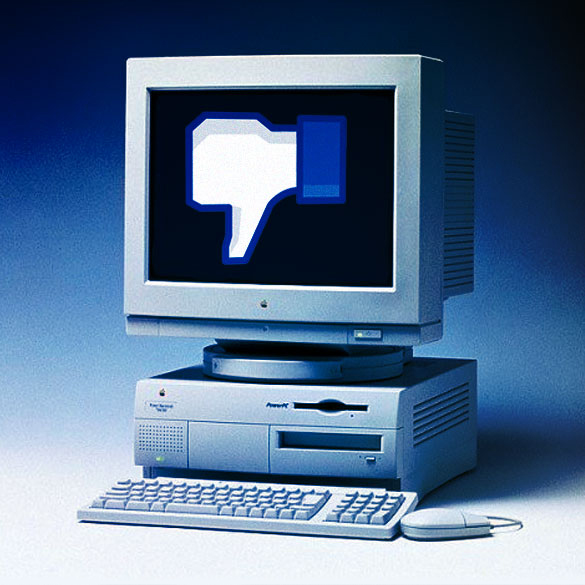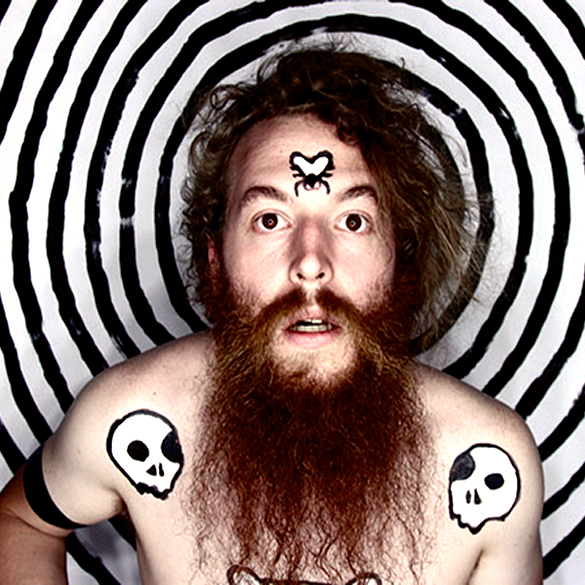Every night for a month straight, I laid in bed watching The Twilight Zone on Netflix. The macabre stories of a parallel universes and alternate dimensions, though written over 50 years ago, still stand as highly relatable stories. Perhaps that was the genius of Rod Serling: his ability to make a monster on the wing of an airplane, an incredulous plot, seem somehow connected to the reality we all live in.
That same summer I made a calculated and cerebral decision to delete my ties with society. I was going to do something I viewed extreme and brash that would expel me from the world I knew.
I deleted Facebook.
I had been thinking it over for weeks, if not months, on end. The decision was calculated, and its logistics came from months of careful social observation starting when I got my first smartphone. Facebook was already programmed into my Motorola Droid X the day I took it out of the box. As simple as inputting my e-mail address and password, I connected myself to the social network I had previously only been able to connect to over my computer.
In the weeks and months that followed, I could feel myself distancing from the world aroud me. After work at the small, up-scale restaurant I worked at in downtown Old Saybrook, the staff and I would frequent the shoreline restaurants and the beaten down dives. We sat in rows on the stools or the outdoor chairs. A lull in conversation, a person getting up to get another drink, and the inactivity of the moment led me to grab my phone out of my pocket and check my Facebook page. Sometimes there was a notification of somebody tagging me in a picture. Other times there would be a message on my wall from a friend I hadn’t seen in a week seeing if I was going out.
But for the most part, there were no notifications. I found myself scrolling through the home pages, clicking on pictures of girls I went to high school or college with, and inserting stupid jokes or waxing poetic over some author’s works I’d read years before.
In some bizarre way, my Facebook profile was the greatest thing about me because it highlighted the things I thought were most unique about my personality. My profile picture showed me flying through the air on my snowboard, and didn’t show my crashes or concussions. The movies I favorited showed my deep artistic side: Mulholland Drive, There Will Be Blood, Synedoche; New York. Yet at the same time it didn’t show that the movie I’d seen the most times in my life was Dumb and Dumber and the most I controlled my favorites movies or books or music, the less I actually was sure if I liked those things. I sculpted who I thought I wanted myself to project but in the course of day to day living, it became tiresome to have to look up and wonder if I was actually living that Facebook projected image.
It wasn’t just me, though. I’d look up at our table, or down the bar, and more and more people were glaring directly into their phones, undoubtedly doing the same thing. Those people whom I saw were my Facebook friends. Sometimes it felt like they were more alive when I was looking at their Facebook profiles than when I was sitting three feet away. It made me wonder if they, too, followed my status updates on my wall or if they browsed my pictures. Did anybody really use Facebook to connect with others, or to project themselves to a collection of people they grouped as “Friends?”
I’d had it by the beginning of June, and after a particularly long run of Twilight Zone episodes, I opened up my laptop, browsed through the user options, and finally executed my profile.
Less than twenty four hours later, the calls started.
“Dude, what’s wrong with your Facebook?” my friend Jason texted.
“Is everything alright with your account?” asked my Mom.
I explained to them that I deleted Facebook, and when I discussed the reasons why social networking was eating away at my social interactions, they responded coolly, yet they never really registered the reasons why anybody would need to delete it.
Most concerned was my sister Lindsey. A second year graduate student in the field of counseling, she must have scanned her books on asocial personality behavioral disorder before she gave me the call.
“Are you depressed, Jesse?” These were the first words to come over the phone.
“No. So you saw I deleted my account?”
“Mom said something so I checked it out. Why would you delete your account? How are you going to stay in touch with all your friends from high school? What about keeping in touch with me? With Mom? She’s worried about you.”
From her standpoint my decision must have seemed antisocial. So I asked her: What is social about Facebook?
“It’s how you figure out what you’re going to do on the weekends. It’s how you get invited to parties. Don’t you care anymore?”
I guess I didn’t, but I couldn’t tell her that. I assured her it was just a temporary thing to get myself grounded. I told her of a book I had recently read, The Shallows by Nicholas Carr, where he goes on to explain how technology and social networking are altering people’s brains to become less socially and personally creative. How I explained it, to her, sounded like a crafty social experiment from a former psychology major at a community college.
At work I sat in my office and talked, actually conversed, with my coworkers. Two coworkers, Dave and Madelyn, became particularly good friends. We built up inside jokes about our cramped office space and our difficult assignments. Dave and I would go out after work and get lit at the bar and for the duration of our time drinking neither one of us would pull out a cell phone and distract from the conversation. Madelyn liked to flirt, and I found myself more charming, more cunning that I would have been with a webpage between us. It came to no surprise that when the discussion of Facebook popped up, both of them freely admitted to deleting it.
“Oh yeah, I deleted mine months ago. It was so annoying trying to keep up with everyone all the time.” Madelyn said.
“It’s pretty much bullshit,” Dave added. “I had, like, 700 friends, but I only hung out with about thirty of them. So I figure I’ll just call the ones I want to see and let the other 670 get a hold of me on my phone if they need me.”
We sat in our office that day and talked about how good it felt to not feel the need to be connected to the world all day. Madelyn talked about how she started to feel less anxiety. “It just made me feel like I had to keep up on it all the time. And I don’t have time for that shit! I’m trying to go to law school!”
I wondered what Dave and Madelyn’s Facebook profiles would look like if they still existed. Dave typically talked about the Chicago Bears, beer and writing, so I imagined his profile to be along the same lines as my old profile: pictures of himself with girls, favorite authors including Hemmingway, Henry Miller, Kurt Vonnegut. Madelyn’s profile couldn’t have strayed too far from the hot chick profile that I used to love to browse when I was awkwardly standing at a bar looking at my phone: ten thousand pictures of her with her hot friends looking very hot, favorite music includes everything that is terrible and mainstream and possibly one or two throwbacks that could make me consider actually marrying this girl.
But they don’t have profiles. They are real people, like me. We exist in this world. We don’t belong to the social networking community of internet slaves who manicure their images on a daily basis, who refresh their browser page every sixty seconds or awkwardly six on a bar stool and go on Facebook because they’re too nervous to interact with strangers.
When the day was over at work I went back to my apartment and propped open my computer. On instinct, I typed the letter “f” into my browser and hit enter, sending me directly to the Facebook home page. But instead of notifications and pictures and jokes and statuses, it was a sparse white page asking for my email and password. I just clicked out of the tab and closed my computer, and thought long and hard about what I was going to do next.
It all reminded me of the episode of The Twilight Zone with the last man on earth. As the episode goes, a bank teller struggles with a cloying wife and an aggravated boss. In an attempt to read in solace, he hides in the bank vault. As he’s sitting there, peacefully reading his book, an atom bomb goes off. He’s knocked unconscious, and he awakens to find the entire population of Earth wiped out. After contemplating suicide, he becomes relieved that he will no longer have the burden of society on his back. Rushing to the library, he looks at the books that he will be able to read. But as he reaches down for a book, his glasses fall from his face, leaving him blind and incapable of reading.
For some strange reason, the memory of my conversation with Dave and Madelyn residing, I couldn’t help think that I might be in that same episode and I wondered what I would do next.
—
Jesse Duthrie is a freelance writer and the Senior Writer of RELEASE, a newsletter focused on criminal justice and recidivism in Connecticut. His work has been published in The Indian River Review, Connecticut Explored, and The Helix Magazine. He is 24 years old.



